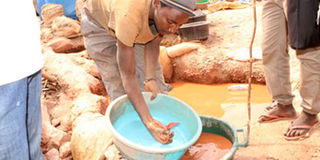Gold tops Uganda’s exports

The report on “extractive industries, land rights and indigenous population/ communities rights” arises from a survey conducted between 2003 and April 2016 by African Commission on Human and People’s Rights and the International Work Group for Indigenous Affairs. FILE PHOTO
What you need to know:
- Gold re-exports have seen the commodity fetch the country a total of Shs154b in August Dorothy Nakaweesi writes.
Latest statistics have seen Uganda’s gold exports record the highest volumes ever. A total of 1,069 kilogrammes of gold were shipped out of the country in the month ending August 2018.
The closest this volume came to was in October 2017 when a total of 1,011 kilogrames were exported.
According to statistics from Bank of Uganda, although not known for being a big miner of gold, the re-exports have seen the commodity fetch the country a total of $41.1 million (Shs154b) in August.
Giving a brief analysis of this performance, Uganda Export Promotion Board (UEPB)’s trade and information executive, Mr John Lwere, said: “We are still studying how much gold we produce. But we believe the refinery at Entebbe is attracting a lot of gold from the region and this is raising the statistics.”
The African Gold Refinery, worth $15 million and the first of its kind in East Africa, was officially commissioned in February last year by President Yoweri Museveni. The gold refinery mainly owned by a Belgian investor, had earlier been operating since 2014.
Reports show that gold was first reported in West Nile region in 1915, but commercial mining did not start until 1933. By 1965, only 148,043ozs were mined in Ankole, Kigezi and Bukedi sub-regions, producing 68, 15, and 16 per cent respectively.
Buhweju plateau was the most productive area, producing 17,511ozs valued at £700,000 (Shs5b) and employing more than 5,000 Ugandans.
Other gold deposits were along the Kashasha River in Kigezi region. Busia gold mines discovered in 1932 were an extension of the Kavirondo mines in Kenya.
Deposits have since been reported in Mubende, Busia, Namayingo and Karamoja areas.
Coffee
Similarly, in the same month, total exports earnings increased to $300.3 million (Shs1 trillion) up from $289m (Shs1 trillion) realized in the month of July.
Coffee, Uganda’s leading export commodity came second after gold in terms of value earned.
A total of 348,952 kilogramme bags of coffee were exported in August thus earning the country $35m (Shs131bn). This was less than $40m (Shs150b) earned in the month of July.
Experts in the industry attribute the drop in coffee earnings to the ongoing global price plummet.
Information from the International Coffee Organisation shows that the prices for all group indicators fell for the fourth consecutive month in September.
The largest decrease occurred in the average price for Robusta, which fell by 5 per cent to 76.70 US cents of a dollar followed by a decline of 4.4 per cent to 99.87 US cents of a dollar for Brazilian Naturals.
Speaking to coffee stakeholders during the International Coffee Day country celebrations, Agriculture minister, Mr Vincent Ssempijja said value addition and branding coffee from the respective regions is one way to mitigate the global falling prices.
Mr Ssempijja said: “Government is going to pass the coffee policy at least before end of year and this will help to streamline the industry.”
Other commodities
The other commodity which exhibited good performance especially in terms of value was sugar. In this month a total of $15.4million (Shs58b) was earned up from $12.2m (Shs45b) realised in the month of July.




